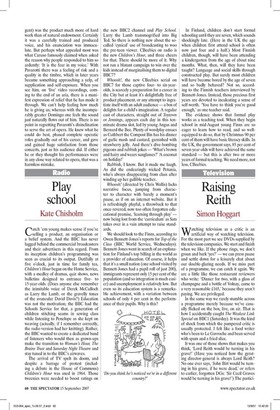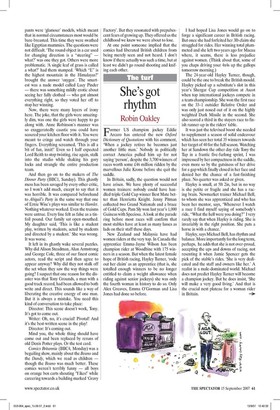Raising Reith
Simon Hoggart Watching television as a critic is an artificial way of watching television. For the most part we see DVDs supplied by the television companies. We start and finish when we like. If the phone rings, we don't groan and bark 'yes?' — we can press pause and settle down for a leisurely chat about our double-glazing needs. If we miss part of a programme, we can catch it again. We are a little like those restaurant reviewers who write: 'Dinner for two, with a glass of champagne and a bottle of Volnay, came to a very reasonable i165,' because they aren't paying. We are privileged.
In the same way we rarely stumble across a programme merely because we've casually flicked on the box, live, on air. That is how I accidentally caught The Weakest Link Special on BBC1 (Saturday). It was the kind of shock from which the pampered critic is usually protected. I felt like a food writer who's been to Le Gavroche and been served with spam and a fried slice.
It was one of those shows that makes you think, 'Lord Reith would be turning in his grave!' (Have you noticed how the gyrating director-general is always Lord Reith? No one ever says, 'John Birt would be turning in his grave, if he were dead,' or refers to earlier, forgotten DGs: 'Sir Cecil Graves would be turning in his grave!') The participants were 'glamour' models, which meant that in normal circumstances most would be bare-breasted. This time they were swathed like Egyptian mummies. The questions were not difficult. 'The round object in a car used for changing direction is a "steering" — what?' was one they got. Others were more problematic. 'A single leaf of grass is called a what?' had them stumped. 'Which "E" is the highest mountain in the Himalayas?' brought the answer 'oxygen'. The smartest was a nude model called Lucy Pinder — there was something mildly erotic about seeing her fully clothed — who got almost everything right, so they voted her off to stop her winning.
Now, there were many layers of irony here. The joke, that the girls were amazingly dim, was one the girls were happy to go along with. Anne Robinson's manner was so exaggeratedly caustic you could have scoured your kitchen floor with it. You were meant to cringe and watch through your fingers. Everything screamed, 'This is all a bit of fun, innit!' Even so I half expected Lord Reith to stop twisting, rise again, stalk into the studio while shaking his gory locks and strangle the entire production team.
And then go on to the makers of The Dinner Party (BBC1, Sunday). This ghastly mess has been savaged by every other critic, so I won't add much, except to say that it was horrible. It was compared beforehand to Abigail's Party in the same way that one of Ernie Wise's plays was similar to Hamlet. Nothing whatever worked. Even the truisms were untrue. Every line felt as false as a tinfoil pound. Our family sat open-mouthed. My daughter said, 'This is like a student play, written by students, acted by students and directed by a student.' She was wrong. It was worse.
It left in its ghastly wake several puzzles. Why did Alison Steadman, Alun Armstrong and George Cole, three of our finest comic actors, read the script and then agree to appear anyway? Why did they not stalk off the set when they saw the way things were going? I suspect that one reason for the disaster was that Tony Grounds, a man with a good track record, had been allowed to both write and direct. This sounds like a way of liberating the creative energy of one man. But it is always a mistake. You need this kind of conversation to take place: Director: This scene doesn't work, Tony. It's got to come out.
Writer: Oh, no, it's crucial! Pivotal! And it's the best-written scene in the play!
Director: It's coming out.
Mind you, the whole thing should have come out and been replaced by reruns of old Denis Potter plays. Or the test card.
Comics Britannia (BBC4, Monday) was a beguiling show, mainly about the Beano and the Dandy, which we read as children — though the Beano was much better. These comics weren't terribly funny — all boys on orange box carts shouting `Yikes!' while careering towards a building marked 'Gravy Factory'. But they resonated with prepubescent fears of growing up. They offered us the childhood we knew we were about to lose.
At one point someone implied that the comics had liberated British children from being merely seen and not heard. I don't know if there actually was such a time, but at least we didn't go round shooting and knifing each other.


























































 Previous page
Previous page